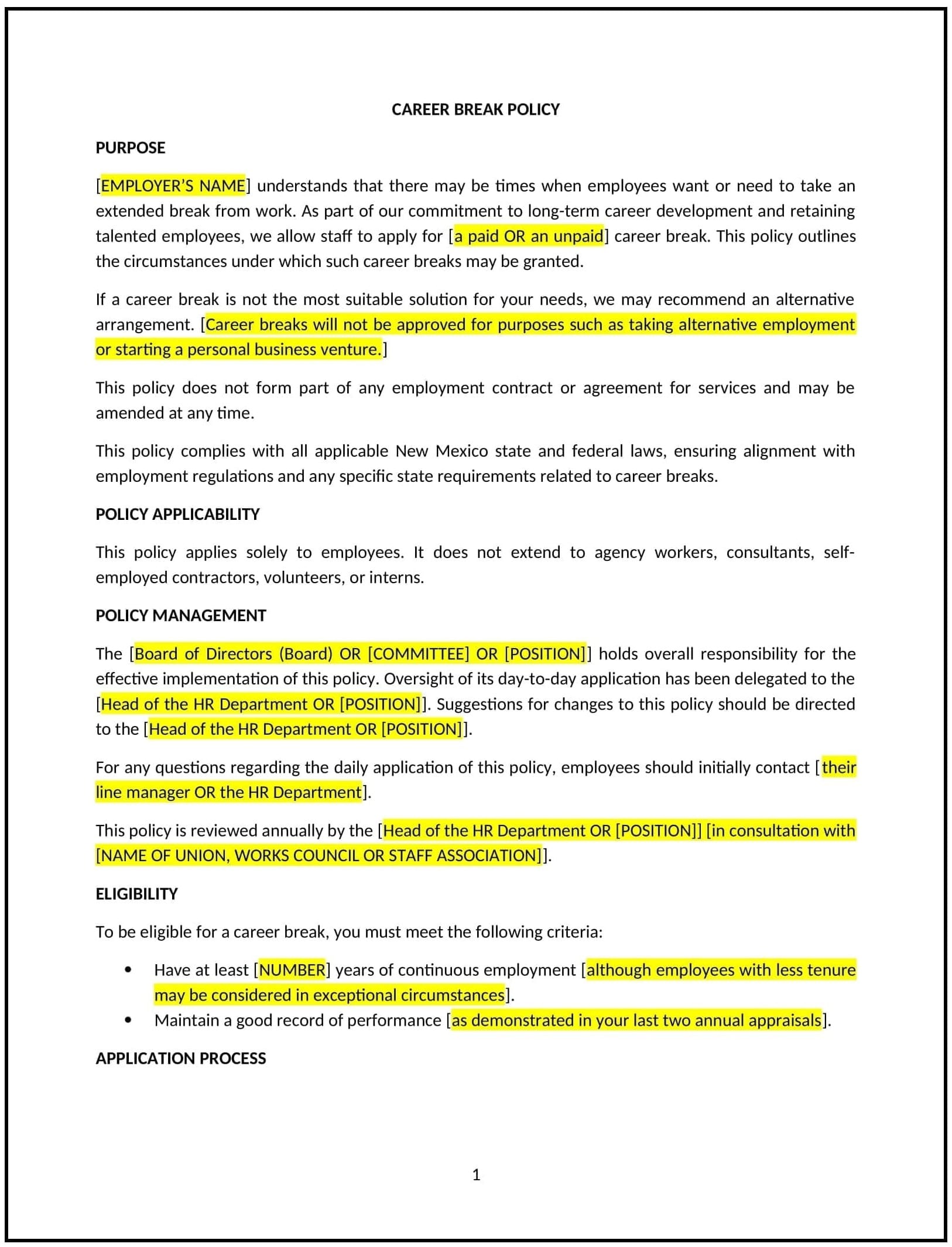Got contracts to review? While you're here for policies, let Cobrief make contract review effortless—start your free review now.

Customize this template for free
Career break policy (New Mexico)
This career break policy is designed to help New Mexico businesses offer employees the option to take extended breaks from their employment for personal reasons, such as travel, education, or family matters. It outlines the procedure for requesting a career break, eligibility requirements, and how the business will manage the employee’s absence.
By adopting this policy, New Mexico businesses can support employees’ personal growth, improve retention by offering flexible options, and maintain a fair and structured approach to career breaks.
How to use this career break policy (New Mexico)
- Define career break eligibility: Clearly outline who is eligible for a career break, such as full-time employees with a minimum tenure or those with a specific role. Set out any criteria that need to be met before an employee can apply for a career break.
- Set the duration of career breaks: Specify how long career breaks can last, typically from a few months to up to a year, and whether they can be extended. Provide guidelines on whether breaks are paid or unpaid and under what conditions.
- Establish the application process: Create a formal procedure for employees to apply for a career break, including the notice required, the documentation needed, and any approval processes.
- Address job security: Clearly state the employee’s job security during the career break, including whether their role will be held for them upon their return or if they will need to reapply.
- Discuss benefits during the break: Specify what benefits, if any, will continue during the break, such as health insurance or retirement contributions. Include how employees may handle benefits during the period they are on leave.
- Reflect New Mexico-specific considerations: Incorporate any local or state laws affecting career breaks, including requirements for managing unpaid leave, employment contracts, and any particular worker rights in New Mexico.
Benefits of using this career break policy (New Mexico)
Implementing this policy provides New Mexico businesses with several advantages:
- Increases employee satisfaction: Offering career breaks demonstrates a commitment to employee well-being and personal development, which can boost morale and retention.
- Attracts top talent: A flexible career break policy can be an attractive feature for prospective employees, especially those looking for work-life balance.
- Reduces burnout: Career breaks give employees the opportunity to recharge and focus on personal goals, leading to better productivity and mental well-being when they return to work.
- Promotes loyalty: By offering this flexibility, businesses can foster a sense of loyalty among employees, as they are more likely to stay with a company that values their personal needs.
- Maintains fairness and consistency: Having a formal policy in place ensures that career breaks are handled consistently, preventing misunderstandings or unfair treatment of employees.
Tips for using this career break policy (New Mexico)
- Communicate the policy clearly: Ensure that all employees are aware of the policy from the outset of their employment, and provide updates if the policy changes.
- Plan for coverage during the break: Businesses should have a plan in place to manage the employee’s workload and responsibilities while they are on a career break, whether through temporary staffing, role redistribution, or other measures.
- Set clear expectations for return: Clearly outline the conditions for returning from a career break, including how employees should notify the business of their return and any steps they need to take before resuming work.
- Track career breaks: Keep a record of career breaks taken by employees to manage scheduling, ensure fairness, and ensure consistency with company policies.
- Review regularly: Periodically review the policy to ensure it is meeting the needs of both the business and employees and to stay in compliance with New Mexico laws.